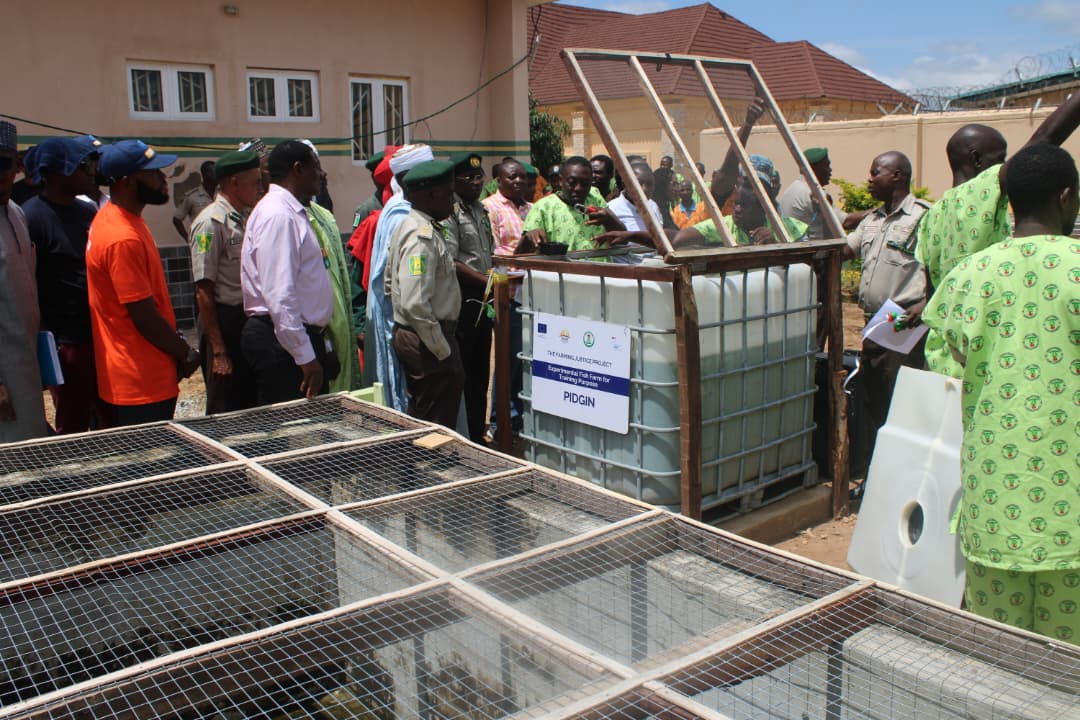ECONOMY & DEVELOPMENT

NGO, NCOS LAUNCH FARMING INITIATIVE TO TRAIN INMATES, BOOST FOOD SECURITY
A Non-Governmental Organisation, Hope Behind Bars Africa (HBBA), has launched the Farming Justice Project at the Kuje Custodial Centre in Abuja to support inmate rehabilitation and address food insecurity in correctional facilities.
The project, implemented in collaboration with the Nigerian Correctional Service (NCoS), is funded by the European Union through International IDEA under the Rule of Law and Anti-Corruption Programme.
Speaking at the official launch, the Executive Director of HBBA, Funke Adeoye, said the initiative represents a practical step towards advancing Nigeria’s correctional reforms.
“With the transition from ‘prison’ to ‘correctional service,’ it’s essential that our facilities reflect this change by focusing on true rehabilitation and empowerment,” she said.
Adeoye explained that the project merges agriculture with restorative justice, enabling inmates to develop essential life skills and contribute meaningfully to society during and after their incarceration.
She noted that more than 80 inmates are currently undergoing agricultural training in okra, watermelon, and tomato cultivation, adding that part of the harvested produce has already been consumed within the facility—an early sign of progress in tackling food shortages.
The initiative is currently running at both the Kuje Custodial Centre and Dukpa Farm Centre in Abuja, with plans to expand to other facilities across the country, including Lagos, where HBBA previously worked with female inmates on agricultural projects.
“Our mission is to reduce reoffending by equipping inmates with sustainable livelihoods upon release,” Adeoye stated. “We also call on partners and concerned Nigerians to support the NCoS in achieving effective rehabilitation and reintegration of inmates.”
She expressed appreciation to the Comptroller General of the Nigerian Correctional Service, Sylvester Nwakuche, for his commitment to reform and willingness to engage in public-private partnerships.
Highlighting the importance of rehabilitation, Adeoye said, “Out of over 80,000 inmates nationwide, only about 3,600 are on death row. This means most will eventually return to society, and it is our collective duty to ensure they are well prepared to lead productive lives.”
In his remarks, the Controller of Corrections, FCT Command, Christopher Jen, commended the project as a major step toward creating a safer and more prosperous Nigeria.
“My vision is a Nigeria where everyone can live without fear. The eagerness of inmates to learn and develop skills gives me hope that such a future is achievable,” he said.
Jen described the Kuje Custodial Centre as a “centre of excellence” for vocational training, noting that inmates are also being trained in barbing, embroidery, carpentry, plumbing, electrical work, shoemaking, soap production, and fishery.
Delivering a goodwill message, Joseph Odeh, representing International IDEA, emphasised the need for collaboration in justice reform.
“Reforming the justice system requires the involvement of all sectors of society. Let today mark the start of a new phase—one that prioritises human development, reintegration, and sustainable transformation,” he said.
The event included a tour of the Kuje facility, the unveiling of the Farming Justice Project, and visits to various vocational training centres where inmates are undergoing practical skill development.
"This represents a significant development in our ongoing coverage of current events."— Editorial Board









